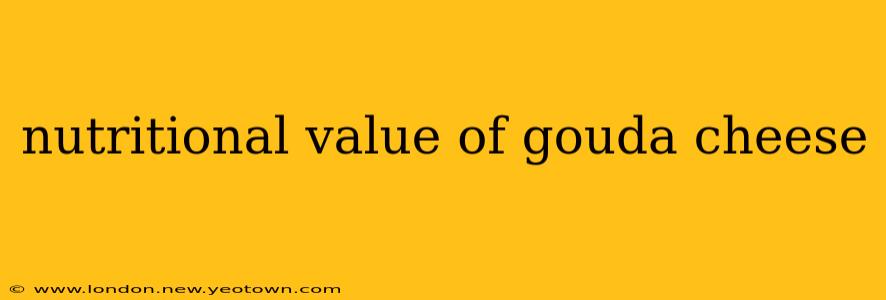Gouda cheese, with its smooth texture and subtly sweet flavor, has captivated cheese lovers for centuries. But beyond its delightful taste lies a surprisingly diverse nutritional profile. This isn't just a snack; it's a concentrated source of several essential nutrients, offering a complex interplay of benefits and considerations. Let's embark on a journey to uncover the nutritional secrets hidden within this beloved cheese.
What is the Nutritional Value of Gouda Cheese?
A single ounce (approximately 28 grams) of Gouda cheese typically packs a nutritional punch, offering a significant amount of protein, fat, and calcium. The precise nutritional content can vary slightly depending on the age and production methods of the cheese, but generally, you can expect to find:
-
Protein: Gouda is a fantastic source of protein, essential for building and repairing tissues. That ounce provides roughly 7 grams of protein, contributing to your daily protein needs.
-
Fat: Gouda is a relatively high-fat cheese, primarily saturated fat. While saturated fat should be consumed in moderation, it also plays a role in hormone production and nutrient absorption. The fat content adds to the richness and creamy texture that Gouda is known for.
-
Calcium: A crucial mineral for strong bones and teeth, Gouda provides a good dose of calcium. That ounce can offer around 200mg of calcium, contributing to your daily recommended intake.
-
Vitamins and Minerals: Beyond protein, fat, and calcium, Gouda also contains smaller amounts of various vitamins and minerals, including vitamin A, vitamin B12, riboflavin, and zinc. These micronutrients contribute to various bodily functions, supporting overall health.
Is Gouda Cheese Healthy?
The health implications of Gouda cheese, like many foods, are nuanced. While it offers beneficial nutrients, its high fat and sodium content necessitate mindful consumption. Regularly including Gouda in a balanced diet, as part of a broader healthy eating plan, is generally considered acceptable for most people. However, individuals with specific dietary restrictions or health concerns should consult with a healthcare professional or registered dietitian before making Gouda a regular part of their diet.
How Much Gouda Cheese Should I Eat Per Day?
There isn't a single "correct" amount of Gouda cheese to consume daily. This depends entirely on your individual dietary needs, overall calorie intake, and health goals. Moderation is key. A serving size of one ounce is often recommended as a guideline, but individual needs vary. Pay attention to your body’s response and adjust your intake accordingly. Remember to consider your overall daily calorie and fat intake when incorporating Gouda into your diet.
What Are the Benefits of Eating Gouda Cheese?
The benefits of Gouda cheese stem primarily from its nutrient composition:
-
Strong Bones: The calcium content supports bone health, reducing the risk of osteoporosis and fractures, particularly important for older adults.
-
Muscle Growth and Repair: The protein content aids in building and repairing muscle tissue, crucial for athletes and individuals focused on maintaining muscle mass.
-
Nutrient Absorption: The fat content assists in the absorption of fat-soluble vitamins, ensuring optimal nutrient utilization from other foods consumed.
What Are the Downsides of Eating Gouda Cheese?
While Gouda offers several advantages, it also has some potential drawbacks:
-
High in Saturated Fat: Excessive saturated fat consumption has been linked to increased cholesterol levels, raising the risk of heart disease. Moderation is crucial.
-
High in Sodium: Gouda can be high in sodium, a concern for individuals with high blood pressure or those watching their sodium intake.
-
Lactose Intolerance: Gouda cheese contains lactose, a sugar found in milk. Individuals with lactose intolerance may experience digestive discomfort after consuming Gouda. Aged Gouda tends to have lower lactose content than younger varieties.
Is Gouda Cheese Good for Weight Loss?
Gouda's high fat and calorie content make it less ideal for weight loss diets. While it offers nutrients, it's crucial to factor its caloric contribution into your daily intake. If you're aiming to lose weight, limit your Gouda consumption and focus on a balanced diet with plenty of fruits, vegetables, lean proteins, and whole grains.
This journey through the nutritional landscape of Gouda cheese reveals a food that is both delicious and nutritionally complex. As with any food, moderation and mindful consumption are key to reaping its benefits while mitigating potential drawbacks. Remember to consult with a healthcare professional or registered dietitian for personalized dietary advice tailored to your individual needs and health goals.

